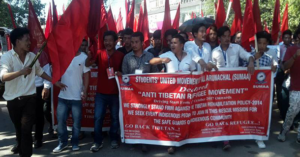Mounting protest from local student and civil society groups has erupted in Arunachal Pradesh (AP), delaying the state’s planned implementation of the Tibetan Rehabilitation Policy (TRP).
Passed by the Indian Union government in 2014, the TRP proposes the extension of temporary land leases and welfare provisions to Tibetan refugees residing within India. The policy also grants Tibetans the right to undertake economic activity and pursue any job for which they are professionally qualified; these can include nursing, engineering, accounting, medicine, etc.
AP state officials announced their intention to implement the policy on August 12 this year, sparking anger and demonstrations from local groups who fear that they could lose out in changes to welfare provision.
In August, the Arunachal Civil Society, which opposes any extension of rights and entitlements on the basis of heritage, voiced concern that the government was making available “extra funds for Tibetan refugees while neglecting the needs of indigenous tribes of the state”.
Whilst the group gave assurances that it does not oppose the settlement of Tibetan refugees within the region, Pate Tayum, President of the ACS, claimed that the policy would “disturb the state’s ethnic balance, resulting in communal tension”.
Weeks later, opposition to the policy had sharply increased, with SUMAA (Students United Movement for All Arunachal) championing a new “Anti Tibetan Refugees Movement” and calling for Tibetan refugees to be ejected from the state.

Student’s United Movement of All Arunachal (SUMAA) took out a mass protest rally from Ganga to Mithun Gate against government’s decision on Tibet policy
“The state cabinet’s decision to adopt TRP 2014 is a matter of great concern. It is sad to see that the state government focusing on the welfare of the refugees while neglecting important issues of the state,” SUMAA Vice President Kaling Moyong said at a press conference on October 3. “Once TRP 2014 is implemented, all the benefits…provided by the Centre to our people will be snatched away by the refugees, which will disturb the state’s ethnic balance”, he said.
Following the conference, SUMAA published details of all Tibetan-owned shops in the state’s capital, threatening forced eviction if implementation of the TRP was not revoked within seven days.
Demonstrations followed. However, while there were demonstrations, the Tibetan representative, Settlement Officer Yangdup, told reporters that no evictions took place, and that there had been no incidence of violence thanks to “overwhelming… assurances and help from the law enforcement authorities”.
Resistance to the policy has so far remained peaceful, however SUMAA President Tagru Tame has not ruled out the possibility of more extreme action in pursuit of the nationalist campaign. “This is just the beginning. If the government doesn’t roll back its decision, we (SUMAA) will go to any extent. Arunachal is not a foreign land, first preference should be given to Indians”, he said.
In a partial victory for SUMAA and other opposition groups, the Arunachal government on Tuesday announced that it would hold back implementation of the TRP until it has carried out consultations with those potentially affected by the change.
AP Chief Minister, Pema Khandu, invited all students unions, community organisations and political parties to meet him to discuss the pros and cons of the TRP, whilst continuing to advocate the benefits of the policy to the state’s tribal peoples. “The policy will not only benefit the Tibetans but also safeguard the rights of the tribal people of the state as it will demarcate their status as a result of which they cannot encroach upon the rights of the indigenous people in the future”, he said.
There are just over 7,500 Tibetan refugees resident within AP, which has a total population of around 1.4 million. Pre-dating it’s recent introduction in AP, the TRP has been implemented by several other Indian states including Himachal Pradesh, Karnataka, Uttarakhand.
Meanwhile, on the international stage, Sino-Indian tensions over the disputed territory of AP continue to escalate following an India-backed visit to the region by His Holiness the Dalai Lama earlier this year. Claim to the region has been the subject of dispute since Chinese annexation of Tibet, due to disagreements over the 1914 Simla Convention, which ceded ownership of the region to British India, whilst leaving it under Tibet’s administrative control.
The Chinese government has issued new names for six destinations within AP since the visit, citing a need to “reaffirm” their claim to the state, and announced completion of a new 400 km express-way from Lhasa to Nyingchi, a town on the Chinese side of the AP border. The road was not built in response to His Holiness’s recent visit, but consolidates Chinese power within the region by facilitating any future movement of military resources to and from the border.




 Print
Print Email
Email